Items
Tag
essential workers
-
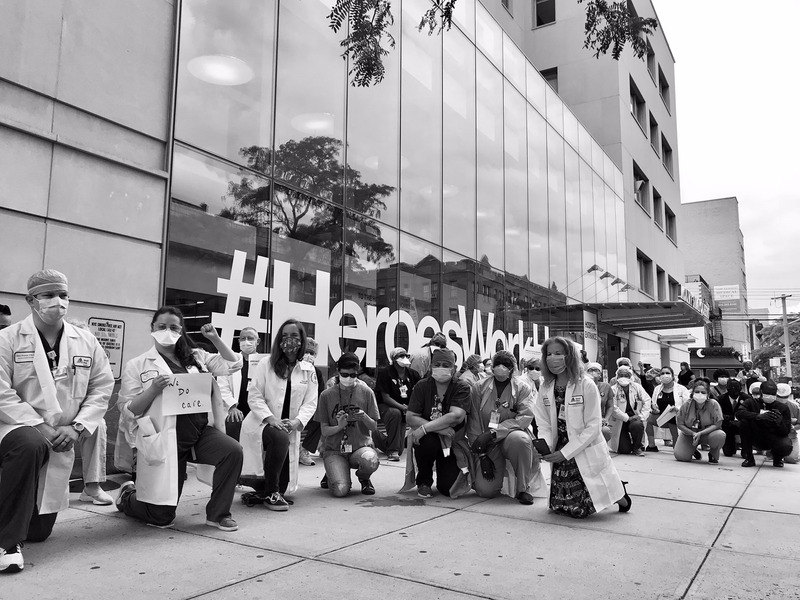 2020-05-02
2020-05-02On A Knee
The photo highlights a peaceful protest that involved the participation of medical faculty. The health care workers included in this photograph included doctors, nurses, admin, security guards and handful of maintenance. This was demonstration to support the Black Lives Matter Movement after the killing of a George Floyd at the hands of a police officer. The individuals in this photo can all be seen taking a knee similar to the protest method used by Colin Kaepernick. National Football League, player Colin Kaepernick took his first knee on September 1, 2016. The taking of the knee went against the tradition of standing during the signing of the National Anthem. Kaepernick said at the time: “I am not going up to show pride in a flag for a country that oppresses black people and people of color”. The people in this picture felt the same exact sentiments as Kaepernick. I chose this source because I wanted historians to understand the impact of the pandemic and the unity it created amongst individuals of different races. As a health care worker, I faced the challenges of Covid-19 directly. The fear of transmitting COVID-19 led to months of isolation from my loved ones. This feeling of loneliness contributed to the decline of mental health for me and many of my co-workers. On May 25, 2021, when George was murdered by a Minneapolis police officer over a suspicion of a counterfeit $20 bill my feeling of loneliness grew tremendously. Being an African American man in the united states was now just as dangerous as the virus killing thousands in New York. When the members of my staff came up the idea of protesting for the rights of African Americans, my feeling of loneliness begin to fade. Kneeling on the ground next to coworkers of all different races reminded of the inclusiveness and unity that we all needed in life. This was a moment in a history that will never be forgotten. -
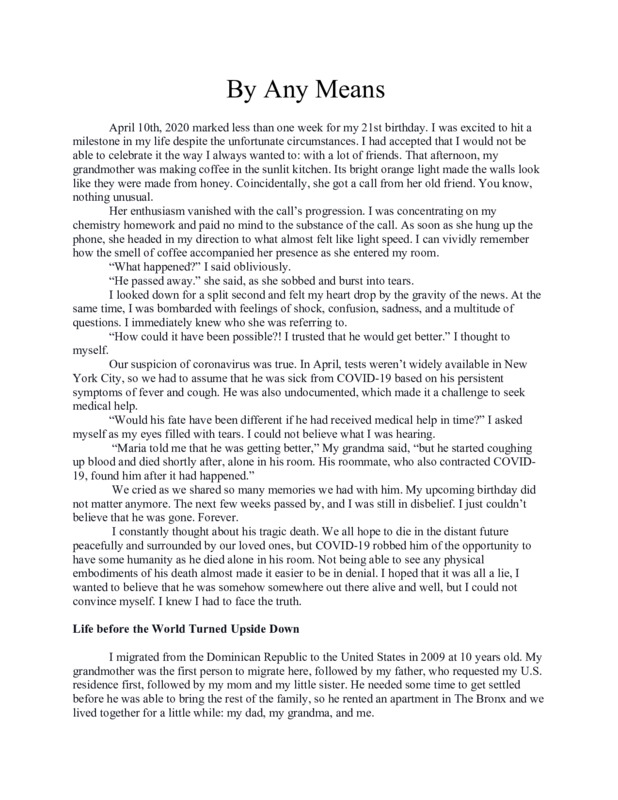 2021-01-20
2021-01-20By Any Means
I lost a father figure during the pandemic who also happened to be undocumented. I connected his life and experience to the overall struggle that undocumented people have been facing due to the pandemic. I also emphasized on their perseverance to survive the COVID-19's financial catastrophe by using one of the few options that they have available: street vending. In general, it reveals the systemic denial of the resources that are essential to surviving the pandemic to undocumented workers, even if they are tax-paying individuals. -
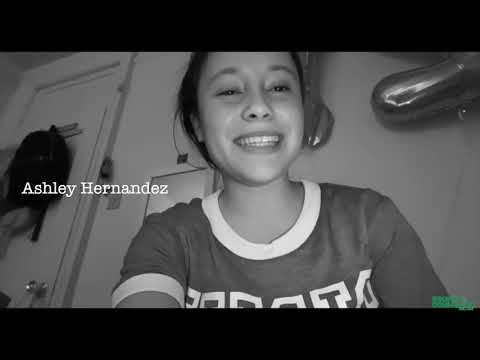 2020-12-02
2020-12-02Theatre Workshop presents: The Essential Bronx - COVID Stories, Part 1
We have preserved in this short film a selection of Theatre Workshop students' authentic experiences during the COVID-19 pandemic and we want to share these stories with you. -
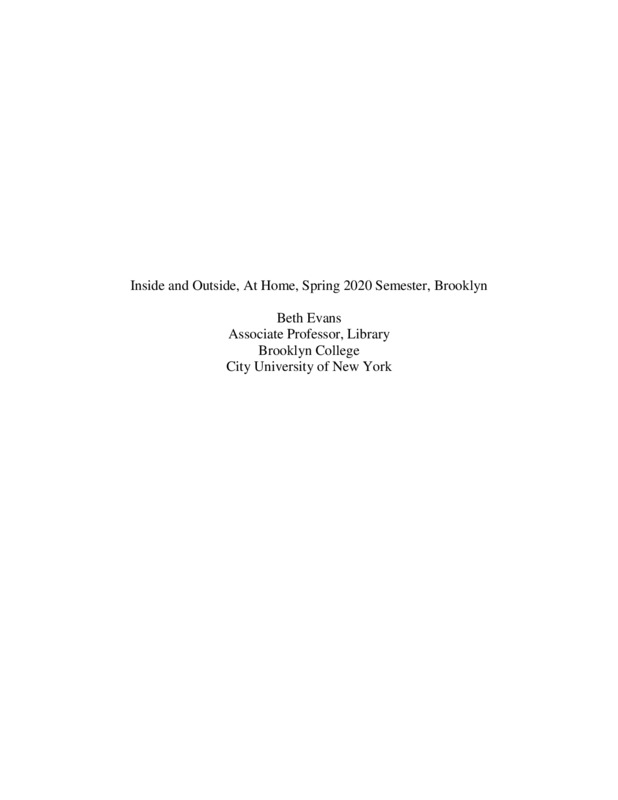 2020
2020Inside and Outside, At Home, Spring 2020 Semester, Brooklyn
This submission interweaves the personal and professional experiences of an associate professor in the Brooklyn College Library with references to events happening in the larger society during the months of the COVID-19 pandemic through early October 2020. -
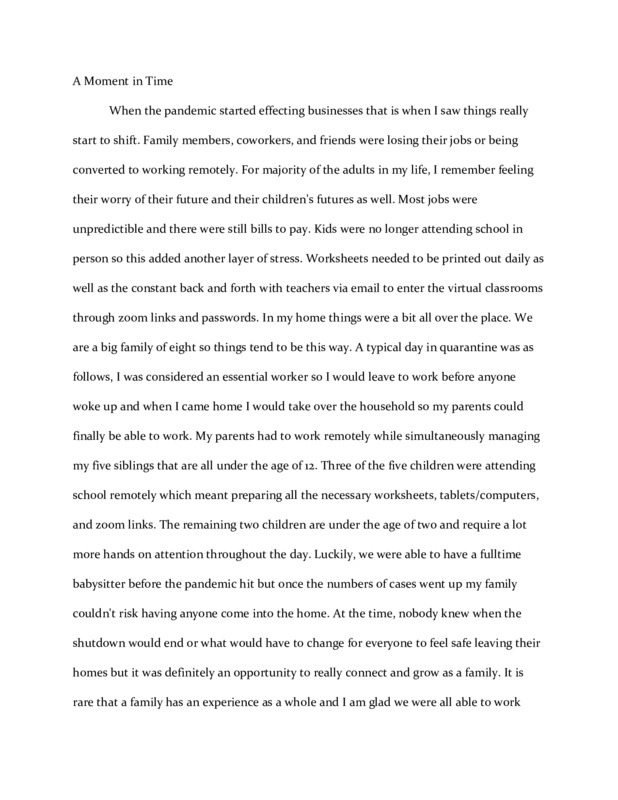 2020-07-07
2020-07-07A Moment in Time
When the pandemic started effecting businesses that is when I saw things really start to shift. Family members, coworkers, and friends were losing their jobs or being converted to working remotely. For majority of the adults in my life, I remember feeling their worry of their future and their children's futures as well. Most jobs were unpredictible and there were still bills to pay. Kids were no longer attending school in person so this added another layer of stress. Worksheets needed to be printed out daily as well as the constant back and forth with teachers via email to enter the virtual classrooms through zoom links and passwords. In my home things were a bit all over the place. We are a big family of eight so things tend to be this way. A typical day in quarantine was as follows, I was considered an essential worker so I would leave to work before anyone woke up and when I came home I would take over the household so my parents could finally be able to work. My parents had to work remotely while simultaneously managing my five siblings that are all under the age of 12. Three of the five children were attending school remotely which meant preparing all the necessary worksheets, tablets/computers, and zoom links. The remaining two children are under the age of two and require a lot more hands on attention throughout the day. Luckily, we were able to have a fulltime babysitter before the pandemic hit but once the numbers of cases went up my family couldn't risk having anyone come into the home. At the time, nobody knew when the shutdown would end or what would have to change for everyone to feel safe leaving their homes but it was definitely an opportunity to really connect and grow as a family. It is rare that a family has an experience as a whole and I am glad we were all able to work together and make the most of this time. Regardless of age, this pandemic has effected us all incredibly and I will definitely look back at this strange time and appreciate the quality time I was able to have with my family. -
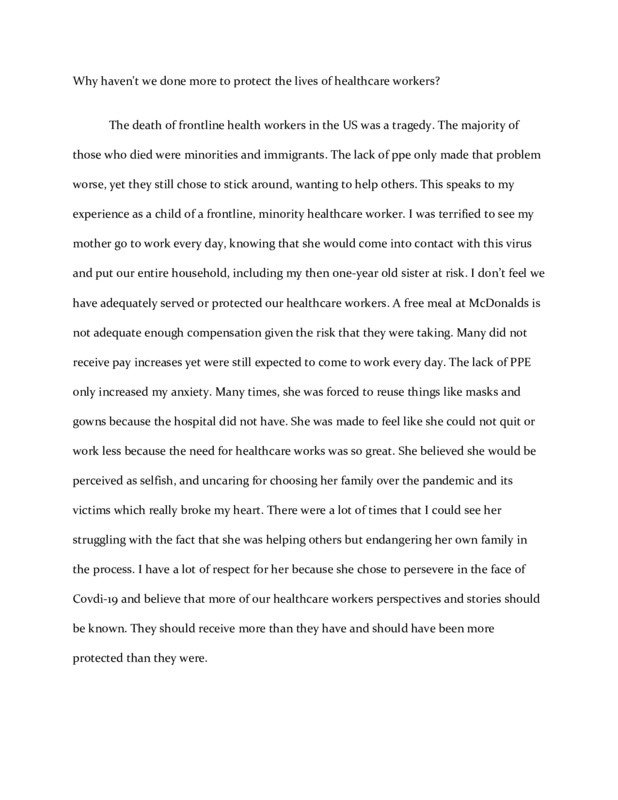 2020-09-25
2020-09-25Why haven't we done more to protect the lives of healthcare workers?
The death of frontline health workers in the US was a tragedy. The majority of those who died were minorities and immigrants. The lack of ppe only made that problem worse, yet they still chose to stick around, wanting to help others. This speaks to my experience as a child of a frontline, minority healthcare worker. I was terrified to see my mother go to work every day, knowing that she would come into contact with this virus and put our entire household, including my then one-year old sister at risk. I don’t feel we have adequately served or protected our healthcare workers. A free meal at McDonalds is not adequate enough compensation given the risk that they were taking. Many did not receive pay increases yet were still expected to come to work every day. The lack of PPE only increased my anxiety. Many times, she was forced to reuse things like masks and gowns because the hospital did not have. She was made to feel like she could not quit or work less because the need for healthcare works was so great. She believed she would be perceived as selfish, and uncaring for choosing her family over the pandemic and its victims which really broke my heart. There were a lot of times that I could see her struggling with the fact that she was helping others but endangering her own family in the process. I have a lot of respect for her because she chose to persevere in the face of Covdi-19 and believe that more of our healthcare workers perspectives and stories should be known. They should receive more than they have and should have been more protected than they were.
